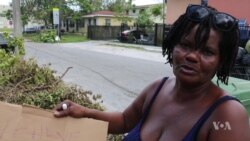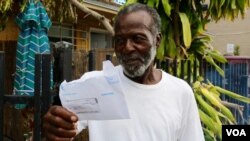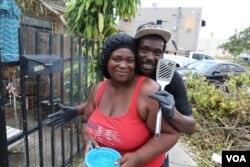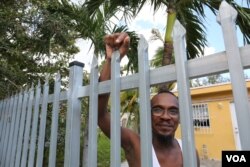It’s been several days since Hurricane Irma’s winds battered Miami’s ‘Little Haiti,’ but Magdalena Ortiz still finds herself crying and shaking in the middle of the night.
“I felt panic, the biggest terror in the world,” says Magdalena, a Honduran-native. “I felt in my heart that I would explode … the pain of a heart attack.”
Miami, Florida escaped the worst of Hurricane Irma, but in ‘Little Haiti’ — home to a low-income African-American and diaspora community from across Haiti, the Caribbean, and Latin America — residents felt the damaging, costly wrath of winds, and still lack electricity days later, amid Florida’s sweltering heat.
For the diverse neighborhood — strong in resemblance to its namesake country, and now plush in scattered palms — a humid 32-degree celsius weekday afternoon with no electricity, and no back-up generators is wearing on an already wary community.
With their stocked coolers quickly diminishing, along with all their perishables, the family barbecues can only last so long.
‘We really need help’
Anthony Bennett, like others in his community, is frustrated that wealthier neighborhoods have begun to see their lights turn on, and not theirs.
“We all bleed the same, so we feel like if they got lights, we should have lights too,” Bennett said. “We shouldn't be over here suffering waiting till next week or the week after.”
Passing by Bennett’s home, neighbor Haitian-native Sylvie Lucien borrowed a purple crayola marker, and penned a cardboard sign asking for assistance.
“We have newborn babies and disabled elderly...we desperate,” Lucien read aloud. “We need help. We really need help.”
For Lucien, the personal financial struggles she endures began long before Irma. But the passing of a hurricane, she says, reveals a devastating reality: if it were worse, she might not have survived.
“You can't go nowhere,” Lucien said, frustrated. “We were going to stay here and die because where can you go with no car, and nobody picking you up?”
Ortiz, on the other hand, says she and her husband had a choice, but decided to stay and not risk separating from their pet dog. Next time, she admits, the decision will be easier.
“I couldn’t handle it again,” Ortiz said.









